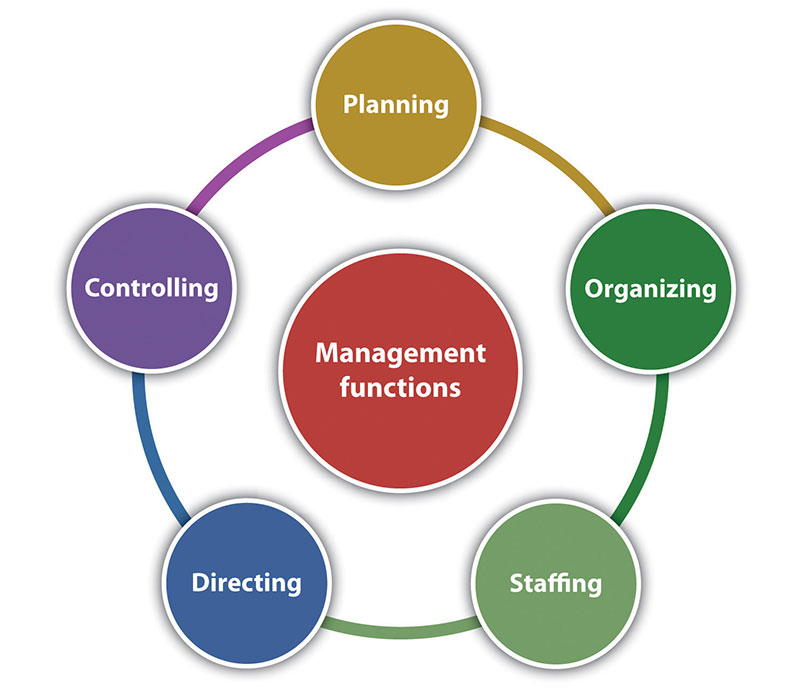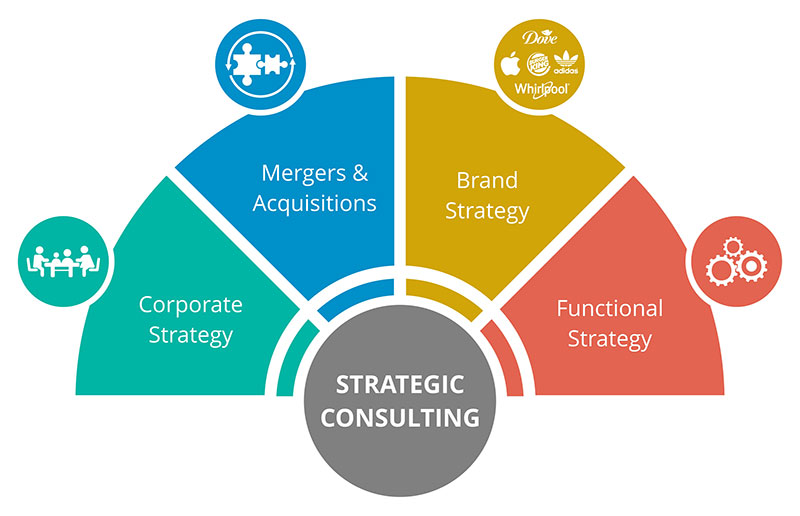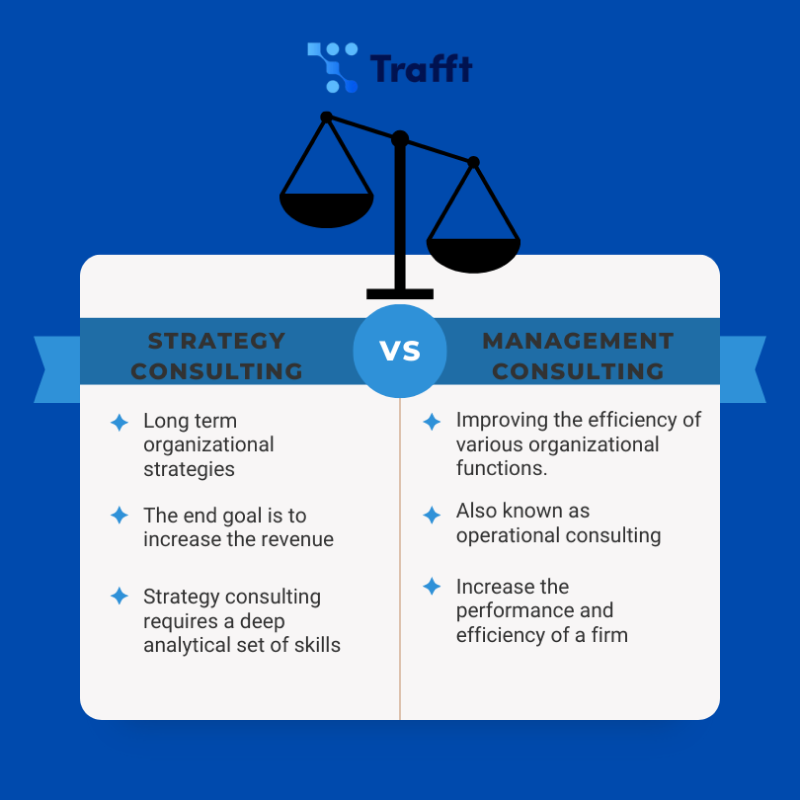Although management consulting and strategy consulting sound similar, there is a clear distinction between the two. The biggest difference is that strategy consulting is done at the executive level, usually with CEOs or a board of directors. The goal here is to determine long-term strategies that can be adopted for the company.
Another difference between management consulting and strategy consulting is that each of them is suitable for different business situations. Management consulting is more geared toward creating replicable methods that bring faster solutions for the issues that they were designed to handle. It also delivers functional excellence on a significant scale in any organization.
In comparison, strategy consulting lets an individual work in different industries. It takes a couple of months for a consultant plan to show how to cut costs, promote a new product, and so on. In simpler terms, strategy consulting has a more problem-solving approach. It goes directly to the needs of individual clients, and the aim is to satisfy them.
Another critical aspect of management consulting vs. strategy consulting is that big companies and corporations hire strategy consultants that focus on policies within a specific niche. Management consultants usually get hired by various company sizes, and they can apply their knowledge to numerous domains.
Explore the difference between management consulting and strategy consulting in this comprehensive article we’ve prepared for you.
Management Consulting vs. Strategy Consulting
TL;DR – Strategy vs. Management Consulting Main Difference
Strategy consulting focuses on long-term organizational strategies and is often done with CEOs or boards of directors. On the other hand, management consulting is focused on improving the efficiency of various organizational functions.
What is management consulting?

First, management consulting is also known as operational consulting. Management consulting aims to improve the functions of an organization. It focuses on bringing results in the short and medium term to make work more effective. This usually leads to lower costs, and it connects with the following areas of a client’s business:
- Finance
- Human Resources
- Risk Management
Typical management vs. strategy consulting approach would include:
- Planning
- Organizing
- Staffing
- Controlling
Management consultant does all this according to an organization’s goals. As many consulting firms handle this, we can sum up that the big goal of management consulting is to increase the performance and efficiency of a firm.
Who needs management consulting?
Wondering who’ll hire you and why if you become a management consultant? Let’s see:
- Businesses hire management consultants to track problems. Many times employees can be too close to a problem inside the organization to be able to spot it. This is the moment when you as a management consultant can join and get to the bottom of what is going on.
- A consultant can be an extra staff member. Businesses save a lot of money by hiring you as a management consultant. This means that if they don’t need full-time employees to perform a specific task, hiring consultants is wiser. Another advantage of hiring a consultant is that an organization can also save extra money as they do not need to pay benefits to the consultant they decide to hire.
- A consultant can be the spark of the change. People do not like changes, but some of them are needed. A consultant can be brought to reflect on the changes that need to be implemented.
What skills do management consultants need?
In any industry, you will find competition, and this is also true for consultants. Some of the joint degrees that help in this field are any Masters in Business Administration or Management. These two are the most favored ones in management consulting.
Typically, both management consulting and strategy consulting also involve finance, risk management, and human resources skills. Besides those people, skills are also critical. This is because each task that a consultant has involves people or systems that are responsible for that. Communication is essential and talking with the client’s managers or employees is going to be part of your central focus. You do not want to be unfair or unjust.
Overview of the skills management consultants need:
- Analytical skills
- Communication skills
- Problem-solving skills
- Interpersonal skills
- Time management skills
What questions does a management consultant answer?
Management consulting focuses on the various functions that an organization performs. Usually, the question that the consultants ask is if the systems are working effectively. The next step is to find out how to increase efficiency as soon as possible.
Most of the time, the solution is related to lowering costs. Consultants can spot the difference between an organization that is staying in business or creating a strategic exit.
Let’s see the questions you should ask as a management consultant:
- How can operational efficiency be enhanced?
- What changes can be made to improve financial performance?
- What organizational structure and staffing adjustments are needed?
- How can risk management be strengthened?
- What strategies can be implemented for sustainable growth?
Top management consulting firms
The biggest management consulting firms today are:

- Deloitte
- Ernst & Young
- KPMG
- PwC
- Accenture
These services are a great start to perform research on and understand the domain better. All the firms are quite active in management consulting and have some of the best results.
Utilize Premium Booking Software for Strategy & Management Consultants
Are you a strategy or management consultant looking to get on top of your client appointments, boost efficiency, and optimize your whole business?
Look no further!
Trafft, the premium booking software for consultants, is here to help you achieve your goals!
Why Trafft?
Effortless Appointment Management
Trafft simplifies your scheduling process, allowing you to effortlessly manage client appointments. No more manual back-and-forths – just a seamless and organized booking experience.
Tailored for Consultants
Designed with the unique needs of strategy and management consultants in mind, Trafft offers specialized features to enhance your consulting practice. It understands your business, ensuring that every appointment aligns perfectly with your expertise.
Automated Reminders
Say goodbye to no-shows! Trafft sends automated email and SMS reminders to your clients, ensuring everyone is on the same page. Your focus remains on your work, not on managing appointments.
Adaptable to Your Industry
Whether you’re a strategy consultant, management expert, or both, Trafft adapts to your specific needs. It’s a versatile tool that caters to the consulting industry, making it your go-to scheduling assistant.
Grow Your Brand with Trafft
Trafft isn’t just a booking tool; it’s a partner in your business growth. With Trafft’s powerful features, you can effortlessly manage your schedule, leaving you with more time to focus on what you do best – providing top-notch consulting services.
Ready to Experience the Trafft Difference?
Explore the full range of features tailored for strategy and management consultants. Take control of your schedule, eliminate booking hassles, and elevate your consulting business to new heights with Trafft.
Don’t let appointment scheduling be a bottleneck in your success. Try Trafft today and discover the premium booking experience designed just for you! Your clients will thank you, and your business will thrive.
P.S. Trafft is completely free for up to 5 employees, so you have literally nothing to lose. Sign up now.
What is Strategy Consulting?
To continue with our management consulting vs. strategy consulting comparison, we will now explore more details regarding strategy consulting. If you want to start a consulting business, read on!

Consultants that handle strategy tend to put the focus on the future of an organization at a broad level. They consider what impact the organization can bring to its structure or operations by making smart changes. The end goal here is to increase the revenue of the client.
Strategy consulting is part of management consulting. By creating strategies that bring new tactics regarding the conduct of engagement most of the time, they deliver excellent results. It stands for how a company is doing in its industry and how inner marker forces can be obtained to get an edge over the competition.
Who should consider strategy consulting?
Strategy management consulting is excellent for entrepreneurs who are operating without any plan. Many entrepreneurs look at the industry they are in, compare the performance of their company, and make decisions based on what feels best for them. Companies can survive like this, but many may also go out of business.
A strategic consultant can help by:
- When a company wants to launch a new product, will its competition be able to offer a better alternative? How can that be prevented?
- Do they want to increase their market share in the upcoming years? Or are they more focused on keeping what they have?
- Does a company want to collaborate with established companies that are in their industry? What is the best way to do this?
- How important is it that they control future developments in their industry? How do they market a product that matches future trends?
What skills are required?
If we compare management consulting and strategy consulting, it’s obvious that strategy is more difficult. Strategy consulting requires a deep analytical set of skills, as well as the application of strong problem-solving skills to build a business case. On top of that, specific industry knowledge will be requested, depending on the focus. This next set of skills is more general but is still needed to start a career in strategy consulting.
- Advanced analytical skills
Collect and inspect data to see where there are problems, then generate solutions together with the needed information about how to implement them.
- People skills
As a consultant, a lot of time will be spent dealing with the management to understand the problems that they are facing at this moment.
Strategy consultants work in tight deadlines and making sure they are met is important.
- Flexibility
Even an expert still has a lot to learn. Being able to search for new and changing trends and information is helpful.
- Industry knowledge
A deep understanding of the industry in which the client operates is crucial for developing relevant and effective strategies. Strategy consultants need to stay informed about market dynamics, regulations, and emerging trends.
- Strategic thinking
The core of strategy consulting lies in developing and executing long-term plans. Strategic thinking involves understanding the big picture, anticipating future trends, and formulating innovative approaches to achieve organizational goals.
Usually, a strategy consultant is going to work for the CEO of the company. They work with the most significant issues an organization has to deal with. The results that they bring need to be done in a short time (usually 3-6 months) and have a considerable impact. This means that they do play an essential role in the future of a company.
What questions does the strategy consultant answer?
Questions are essential when considering the differences between management consulting and strategy consulting strategies. In the end, to achieve results, you need to perform a strong analysis, collect data, and act upon the data you receive.
Let’s see some questions you should ask as a strategy consultant:
- What is the long-term vision of the company?
- And what should be the portfolio of the business?
- Why should we enter this market?
- What is the best way to extract value from the SUV division?
Top strategy consultant firms
The top firms that handle strategy consulting are:

- Mckinsey
- BCG
- Bain
Practical Example of The Difference Between Strategy Consulting and Management Consulting
Scenario: Declining market share
Strategy consultant approach:
A strategy consultant would take a holistic approach, considering the long-term vision and goals of the company. They would conduct an in-depth analysis of the market, competitors, and industry trends. Here’s how they might approach the problem:
- The strategy consultant would thoroughly analyze the current market conditions, identifying key trends, customer preferences, and competitive forces.
- Understanding the strategies employed by competitors, their strengths, and weaknesses would be a crucial part. This involves assessing how the client can differentiate itself.
- Conducting a comprehensive SWOT analysis (Strengths, Weaknesses, Opportunities, Threats) to identify internal and external factors affecting market share.
- Developing a strategic plan that outlines specific actions to be taken over an extended period. This could involve product innovation, entering new markets, or strategic partnerships.
- The strategy consultant would work closely with C-level executives to align the strategy with the overall vision of the company.
Management consultant approach:
A management consultant, focusing on improving operational efficiency, would take a more immediate and functional approach to address the declining market share:
- The management consultant would analyze the company’s internal processes, identifying inefficiencies that may be affecting the ability to compete.
- Looking for ways to reduce costs without compromising quality, which could involve streamlining production processes or renegotiating supplier contracts.
- Assessing the skills and capabilities of the workforce and providing training to enhance their abilities, ensuring better productivity.
- Identifying bottlenecks in the supply chain and proposing improvements to ensure a more responsive and cost-effective system.
- The management consultant would aim for quick and measurable results, addressing immediate challenges to stabilize and improve the current market share.
Ending Thoughts on Management Consulting vs. Strategy Consulting
In conclusion, these are the particularities regarding management consulting and strategy consulting. Hopefully, this article has helped answer some questions you may have had and will help you choose your career path.
Are you a consultant or you are working in a consulting firm and you want to focus less on scheduling your meetings and more on your actual work?
Why don’t you try a premium booking software for consultants to take that off your mind?
Remember, Trafft is free for up to 5 employees, meaning this is a risk-free opportunity for you! Sign up now and experience the benefits of all-in-one scheduling software for consultants.
FAQs About Management Consulting vs. Strategy Consulting
1. What is the difference between a management consultant and a strategic consultant?
Focus is the primary distinction between management consulting and strategy consulting. Although strategy consulting focuses on creating and implementing plans that will assist the business in achieving its long-term objectives and competitive advantage, management consulting is concerned with increasing an organization’s effectiveness, productivity, and overall operations.
2. Can someone work as a management consultant and strategy consultant at the same time?
Although it is uncommon, it is feasible for someone to hold dual positions as a management and strategy consultant. It is uncommon for someone to excel at both management consulting and strategy consulting at the same time because they call for separate skill sets. Yet, certain consulting organizations might provide both kinds of services, and over time, a person might gain experience in both fields.
3. Which consulting field is more focused on implementation?
The focus of management consulting is largely on implementation because it frequently entails finding inefficiencies and making improvements to the organization’s operations. On the other hand, management consultants implement high-level strategies and plans developed by strategy consulting.
4. What types of problems do management consultants typically solve?
Problems with organizational structure, productivity, and operational efficiency are frequently resolved by management consultants. They could assist clients with reducing costs, streamlining processes, enhancing performance overall, and improving supply chain management.
5. What types of problems do strategy consultants typically solve?
Problems with long-term planning, market analysis, and competitive advantage are often solved by strategy consultants. To give businesses a competitive edge, they might assist customers in creating new business models, breaking into new markets, conducting market research, and examining rivals.
6. Which consulting field is more suitable for someone with a finance background?
Given that management consulting frequently entails enhancing financial performance and operational efficiency, it might be better ideal for someone with a background in finance. Given that it entails creating high-level strategies to accomplish long-term objectives, strategy consulting may be ideal for someone with a background in marketing or corporate strategy.
7. What are the typical deliverables produced by management consultants?
Reports outlining analysis findings, suggestions for enhancements, and change implementation strategies are common deliverables generated by management consultants. To assist clients in making adjustments, they might also provide training materials or offer to coach.
8. What are the typical deliverables produced by strategy consultants?
Market research studies, business strategies, and strategic plans outlining the client’s long-term objectives and how they will be attained are examples of common deliverables generated by strategy consultants. They might also offer senior executives mentoring or advice on implementation.
9. Do management consultants typically work with senior management, while strategy consultants work with C-level executives?
While strategy consultants deal with top executives and C-level executives, management consultants often work with mid-level managers. This is because, in contrast to strategy consultants, who concentrate on high-level strategic planning and collaborate closely with top executives, management consultants are more concerned with increasing operational efficiency and may engage with lower-level managers to make changes.
10. Is there a difference in the consulting process between management consulting and strategy consulting?
Management consulting and strategy consulting have different approaches to consulting. A more hands-on approach is generally used in management consulting when consultants collaborate closely with the client’s team to find inefficiencies and execute changes. On the other hand, strategy consulting frequently takes a higher-level approach, when consultants collaborate with senior executives to create long-term plans and strategies.
Ready to Dive in for More Fun?
Check out these extra resources to uncover all the details about the consulting business:
- Boutique Consulting Firms: Everything You Need to Know
- How to Become a Tax Consultant and Be Great at It
- What is a Business Automation Consultant and How You Can Be One
- How to Become an Independent Consultant
- The 30 Best Apps for Consultants
- The Best Consultant Scheduling Software for Busy Consultants
- The Business Consulting Software You Need to Succeed










